Resume
Radiologist Cover Letter Examples

May 29, 2025
|
12 min read
Creating a standout radiologist cover letter: Ensure your skills are clearly visible as you diagnose the best ways to showcase your expertise and experience. Practice clear communication, just as you would in a medical report.
4.70 Average rating
Rated by 348 people
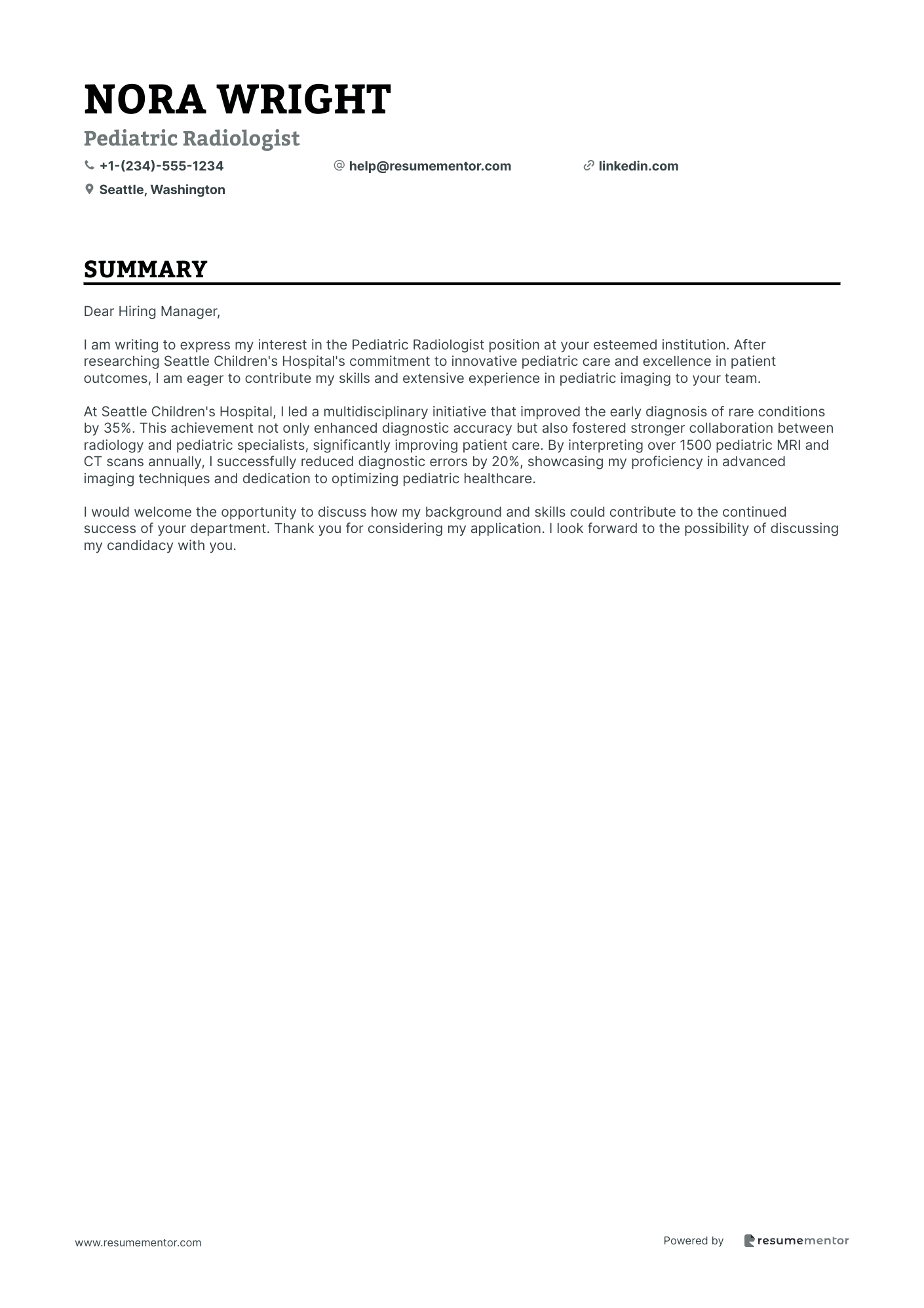
Pediatric Radiologist
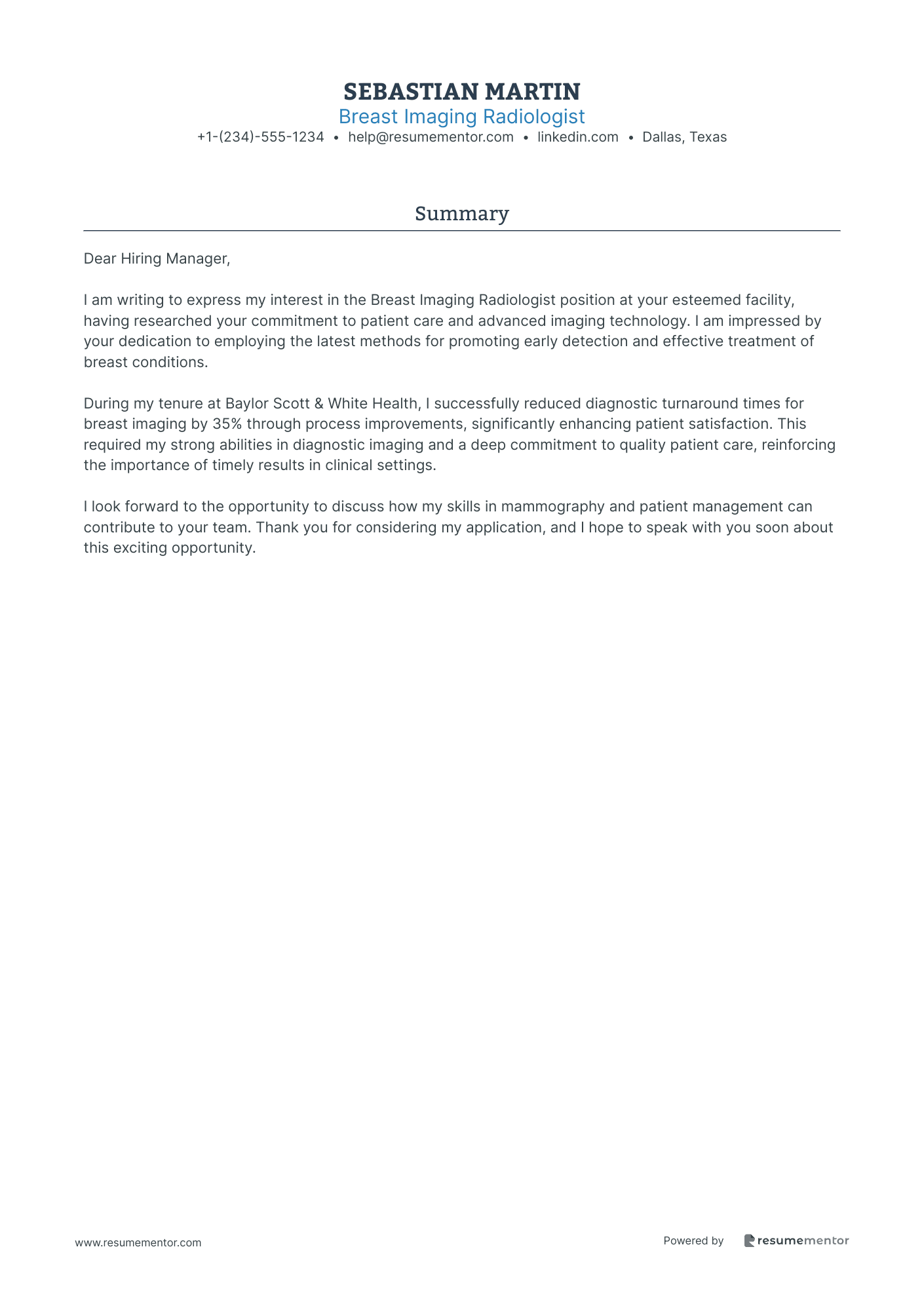
Breast Imaging Radiologist
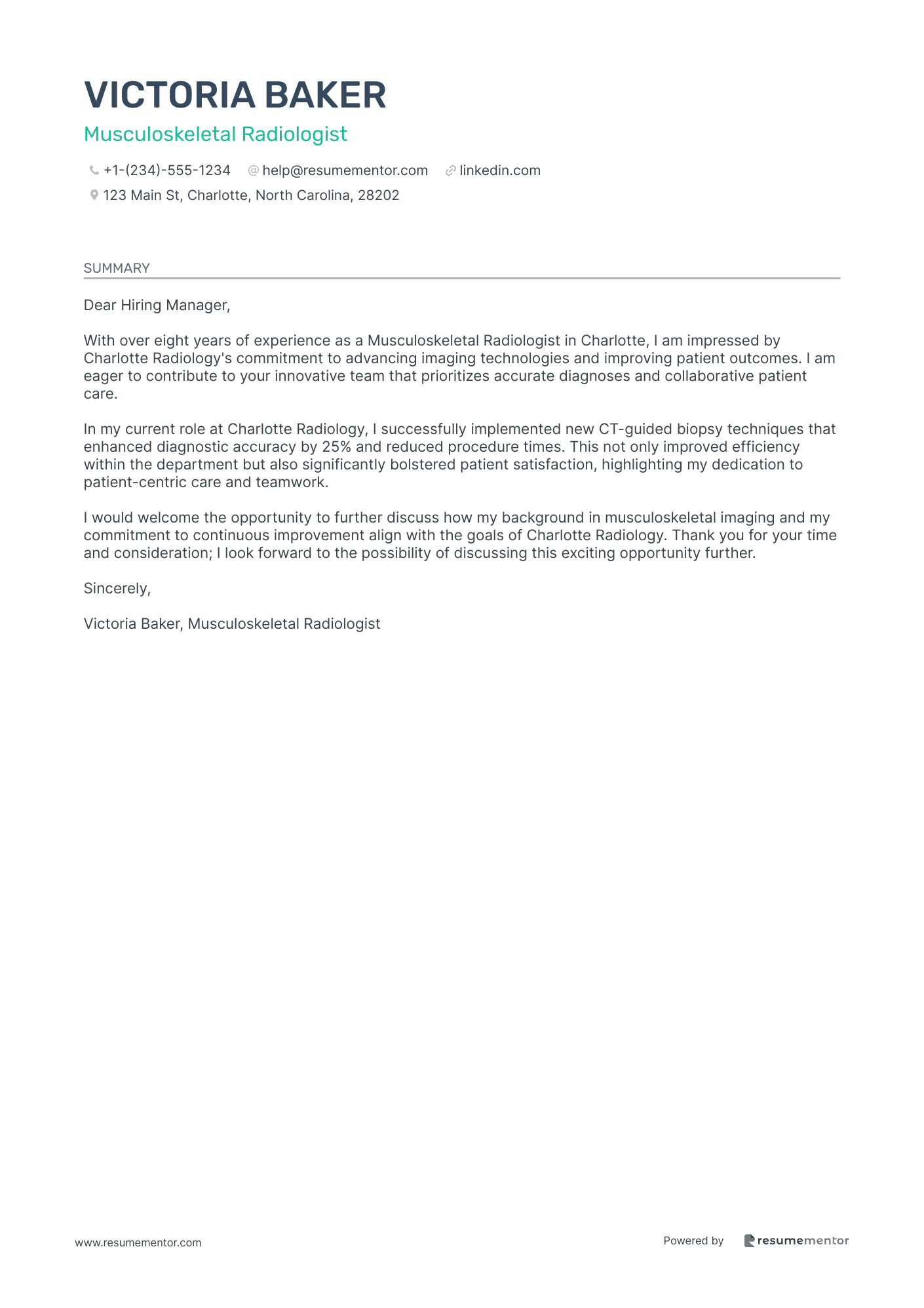
Musculoskeletal Radiologist
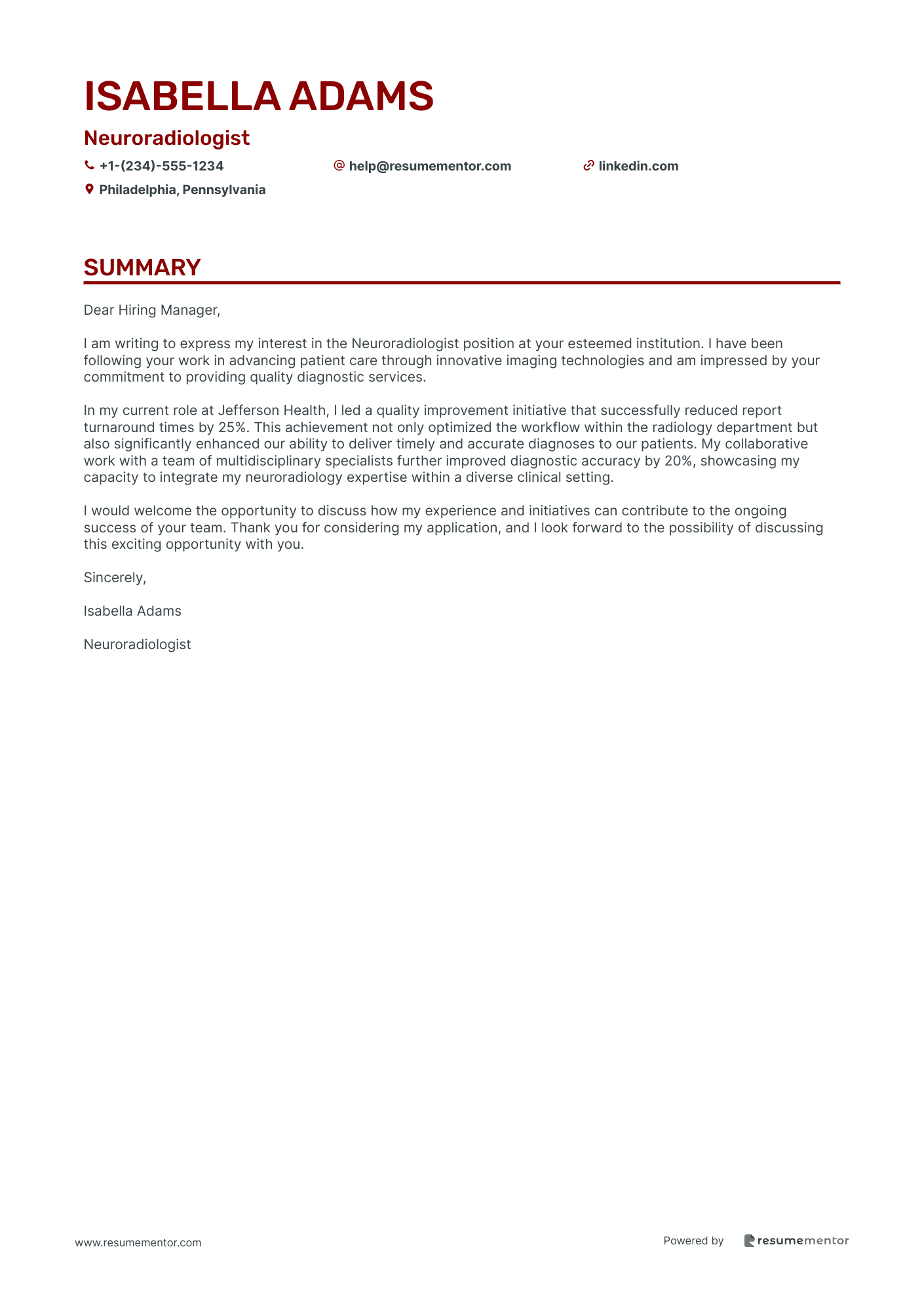
Neuroradiologist
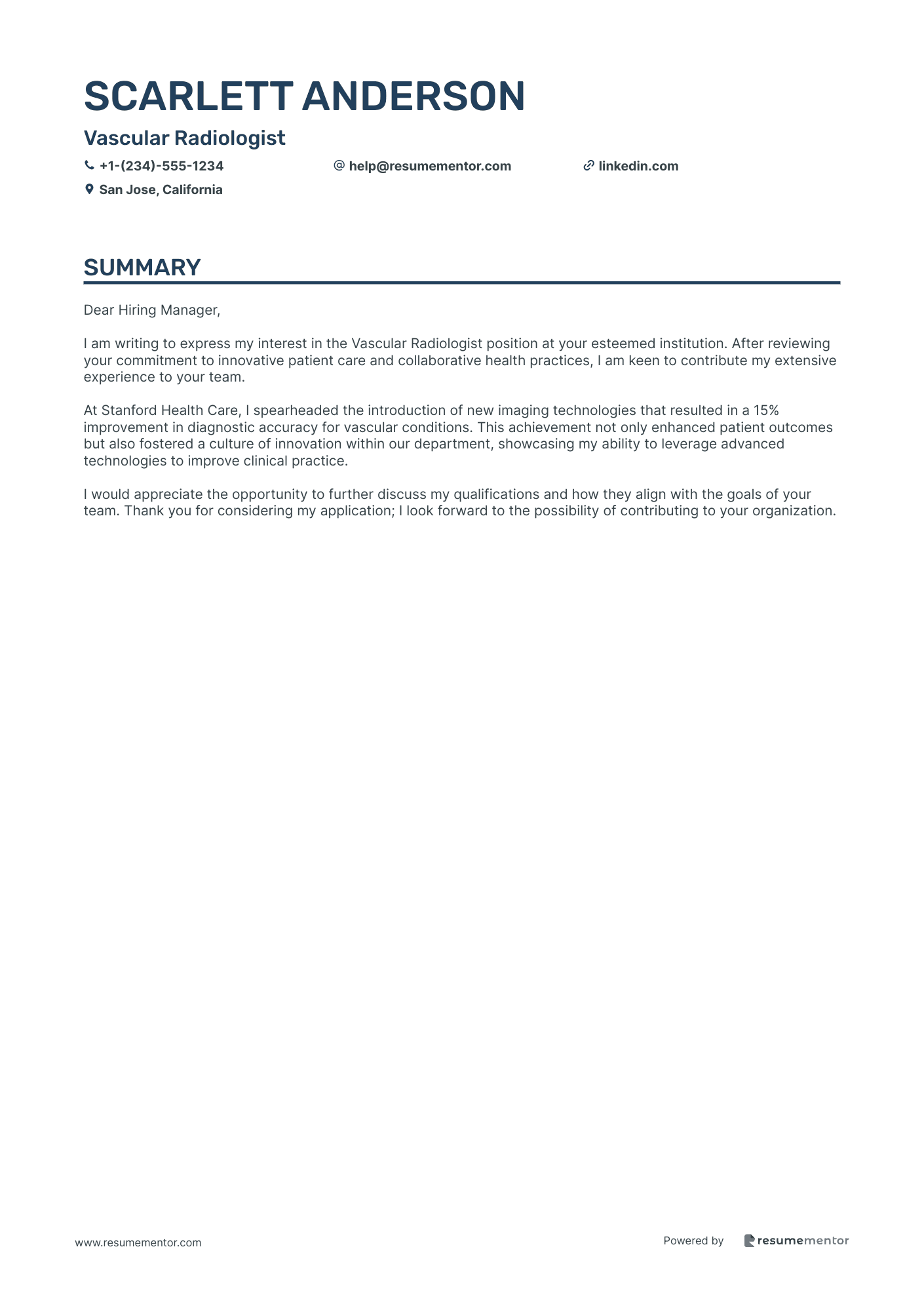
Vascular Radiologist
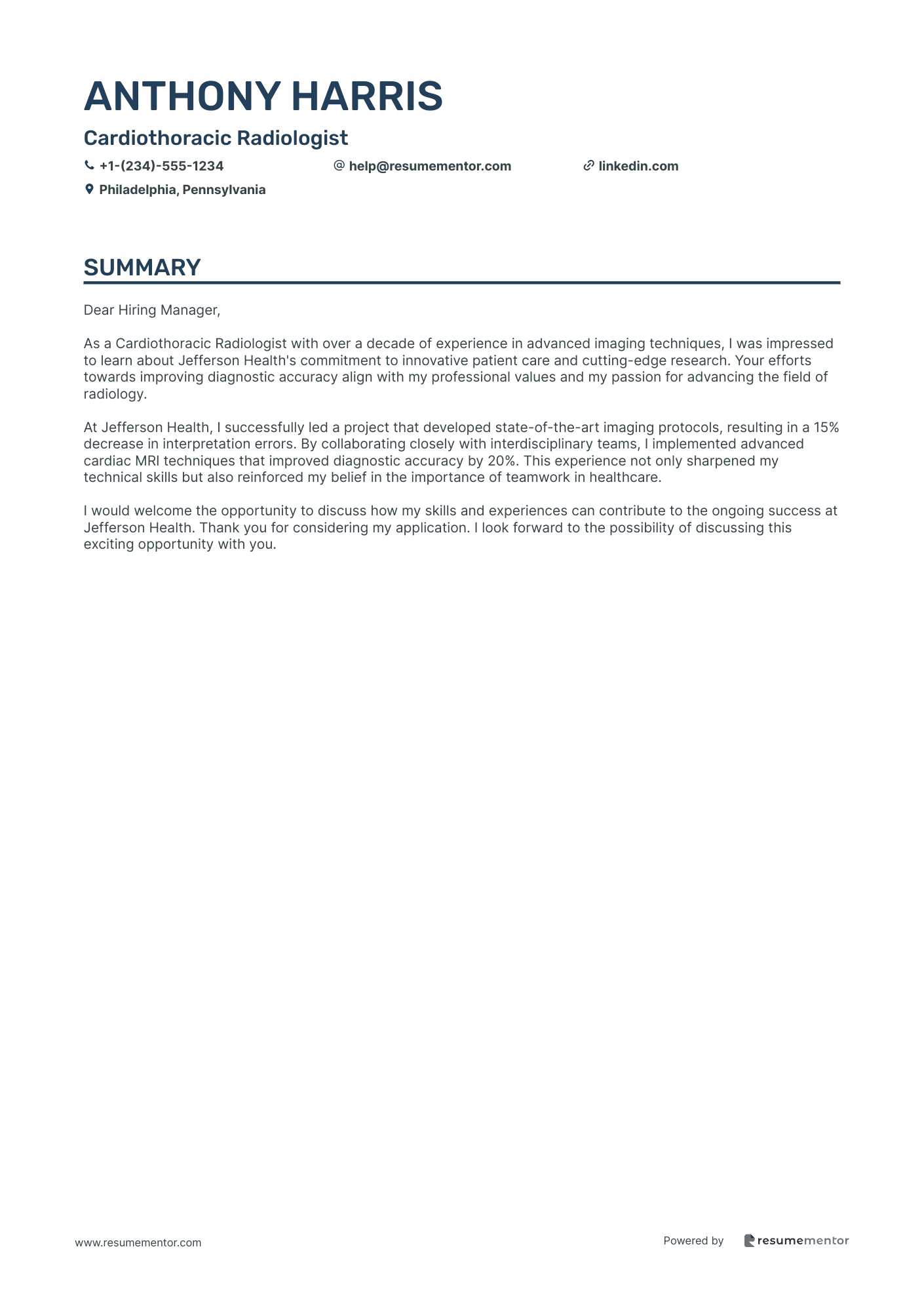
Cardiothoracic Radiologist
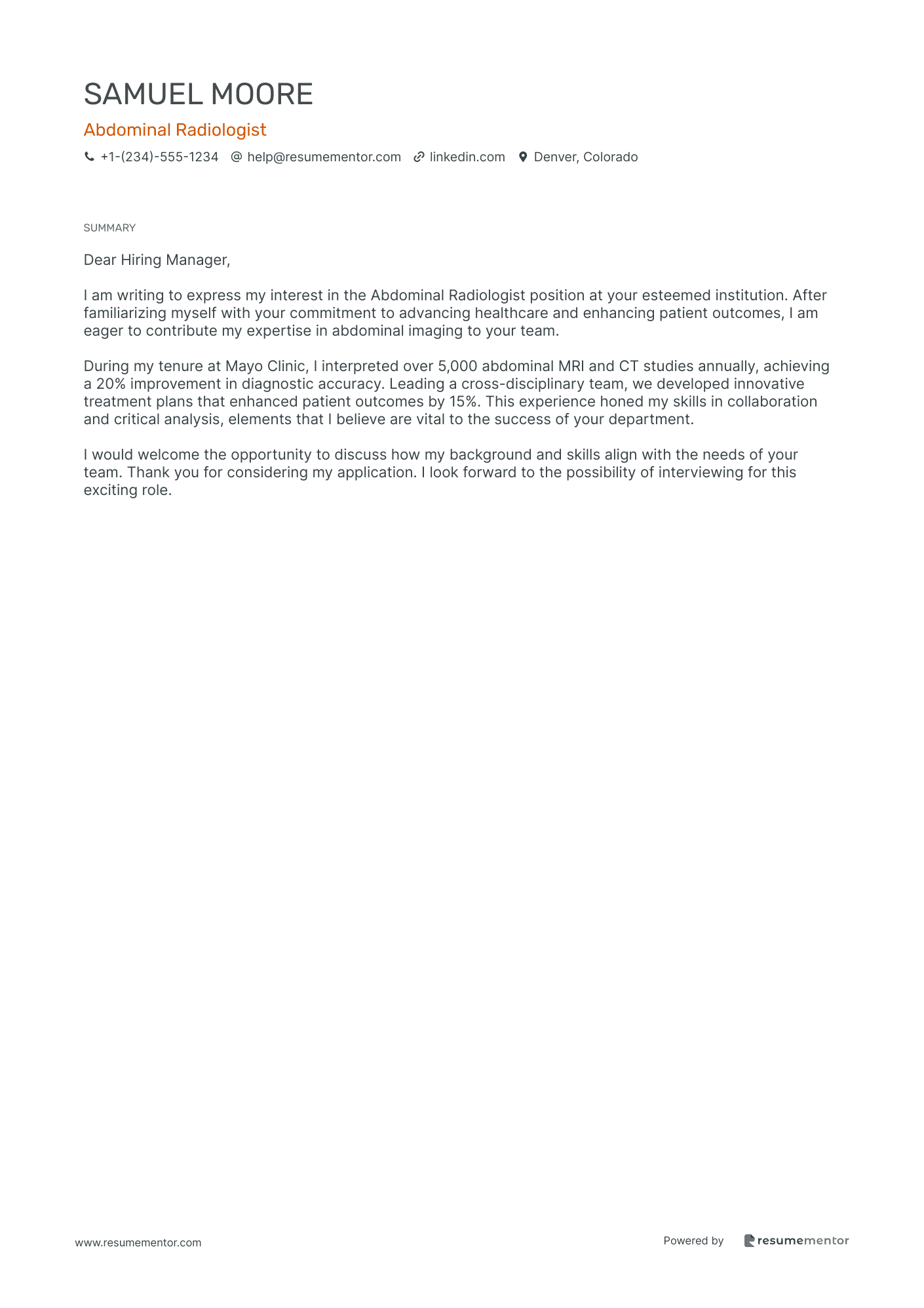
Abdominal Radiologist
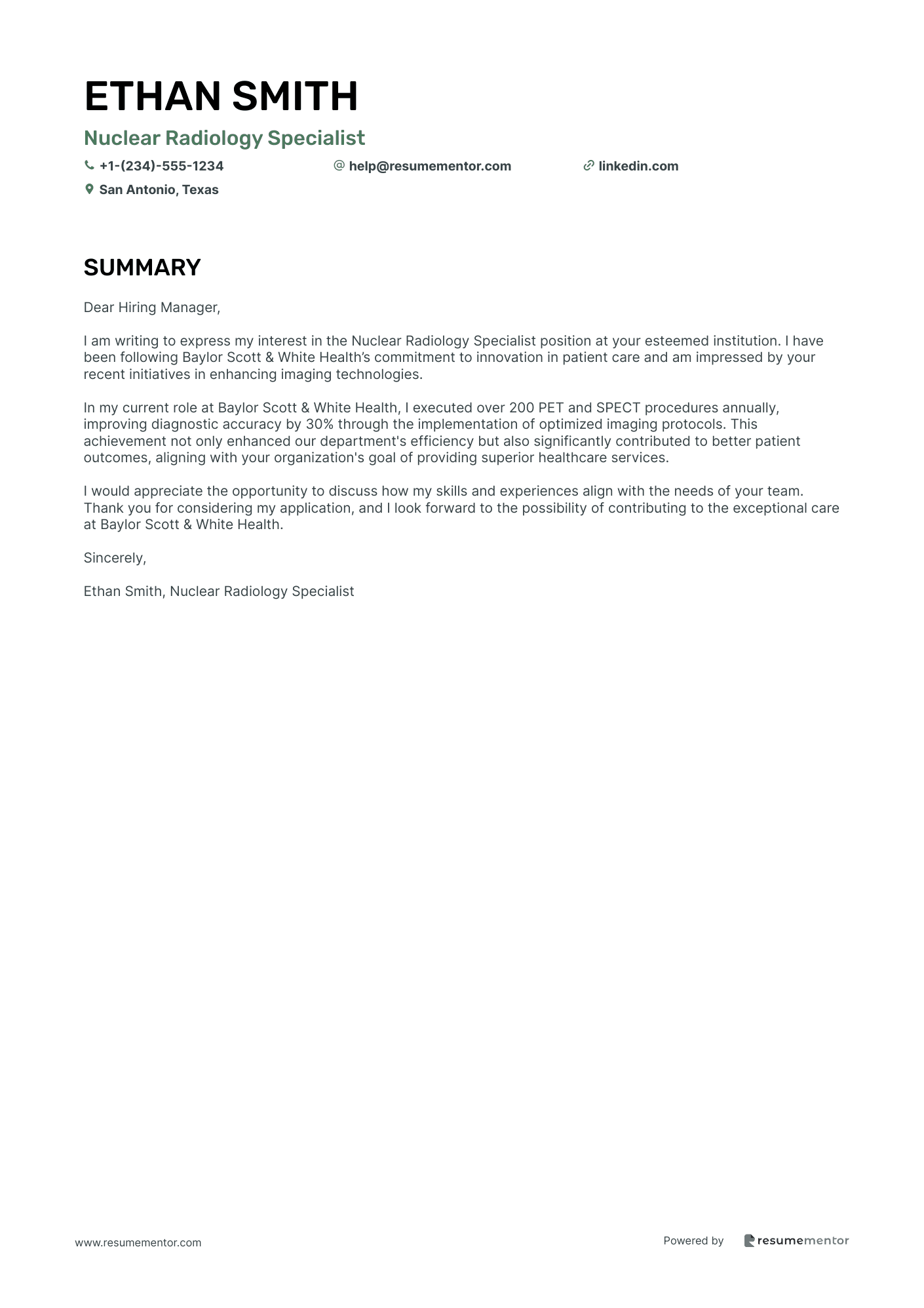
Nuclear Radiology Specialist
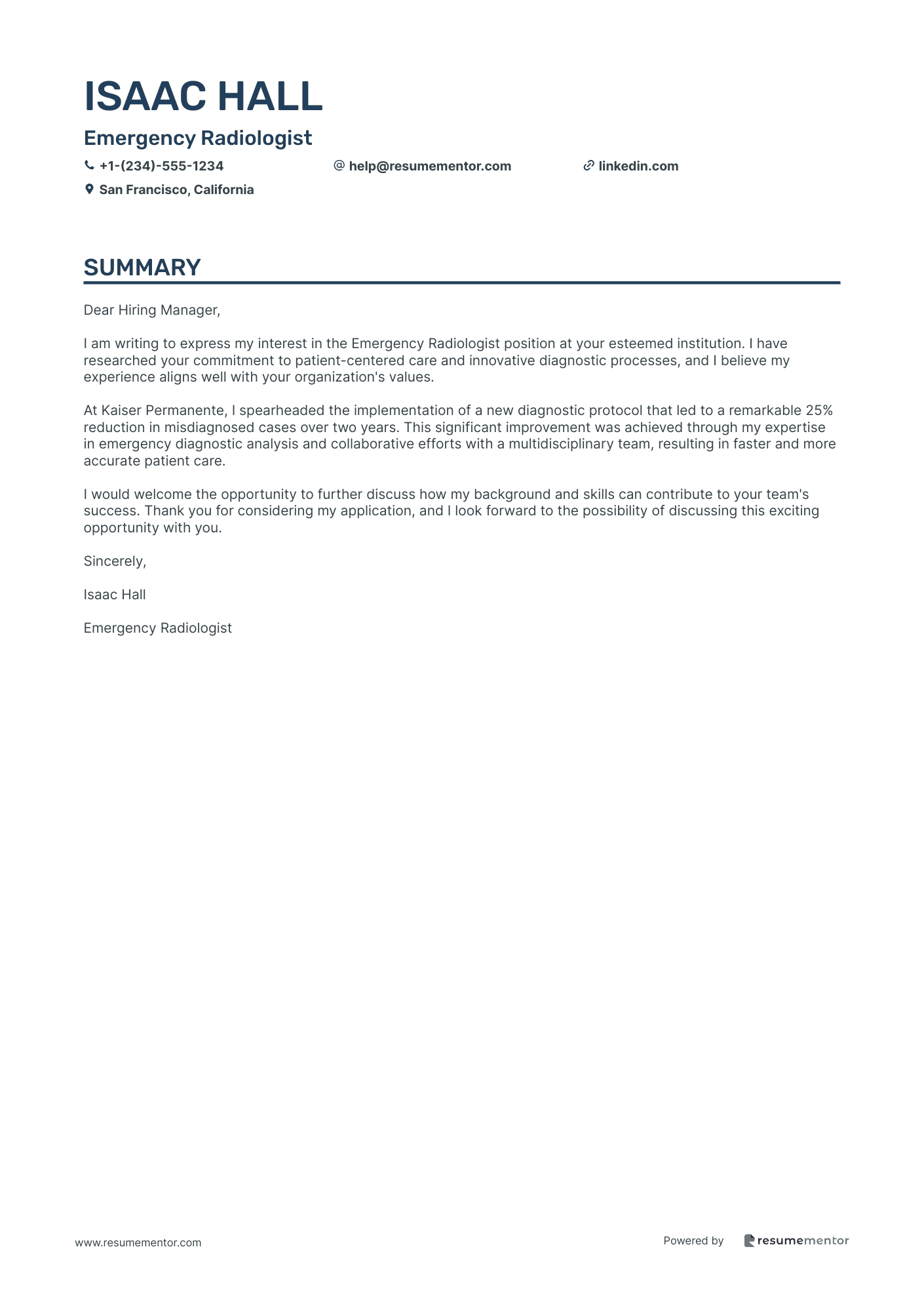
Emergency Radiologist
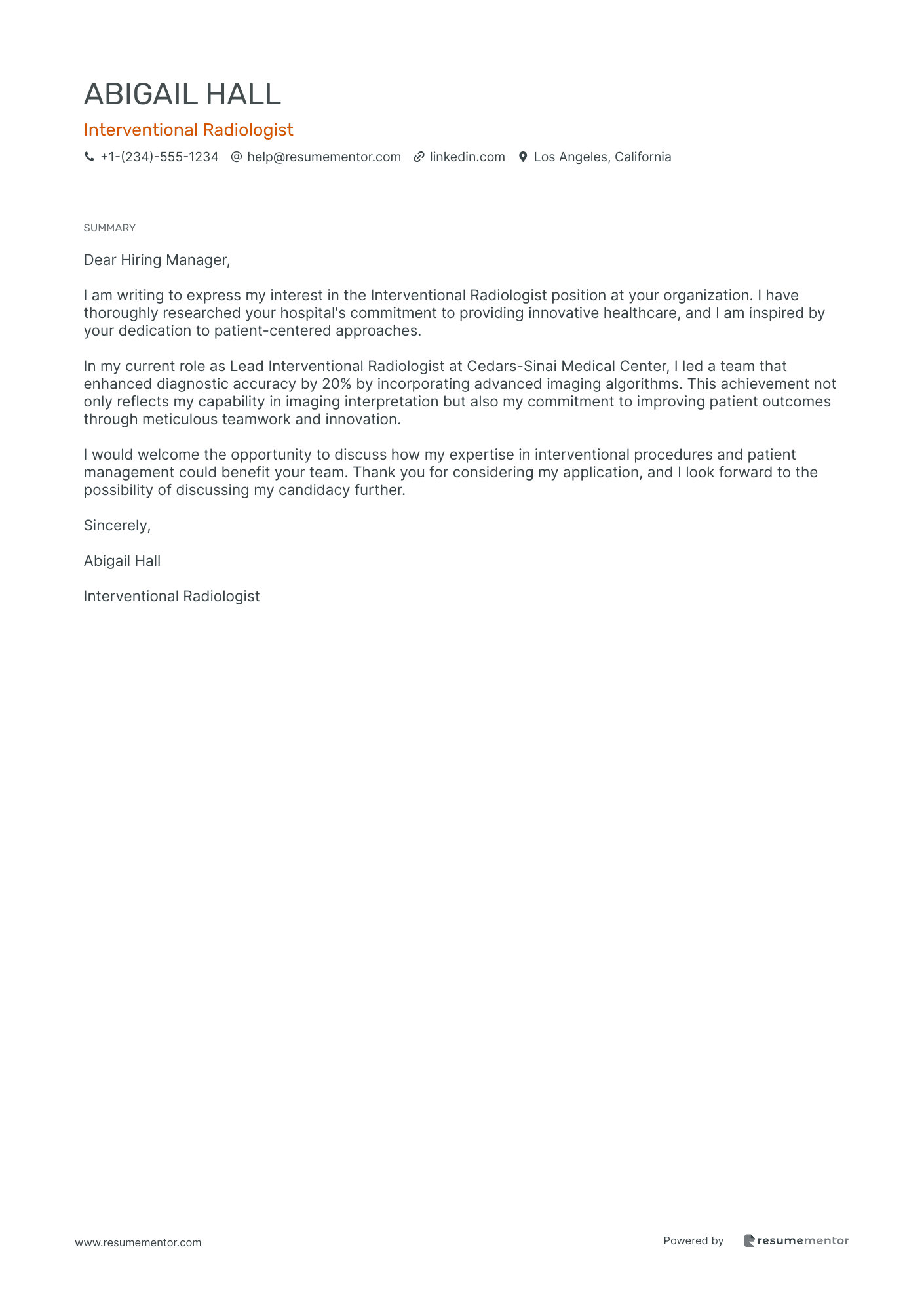
Interventional Radiologist

Pediatric Radiologist cover letter sample
When applying for this specialized medical position, it's important to highlight your experience with imaging techniques specific to child patients. Showcase any training in pediatric radiology and any certifications, such as board certification or fellowships. Detail hands-on experiences, emphasizing how your skills have improved diagnostic accuracy. Discuss your ability to communicate complex results clearly to parents and healthcare teams. Use examples that illustrate how you have made a positive impact on patient care, following the 'skill-action-result' format to demonstrate your effectiveness.
Nora Wright
Pediatric Radiologist
Summary
Dear Hiring Manager,
I am writing to express my interest in the Pediatric Radiologist position at your esteemed institution. After researching Seattle Children's Hospital's commitment to innovative pediatric care and excellence in patient outcomes, I am eager to contribute my skills and extensive experience in pediatric imaging to your team.
At Seattle Children's Hospital, I led a multidisciplinary initiative that improved the early diagnosis of rare conditions by 35%. This achievement not only enhanced diagnostic accuracy but also fostered stronger collaboration between radiology and pediatric specialists, significantly improving patient care. By interpreting over 1500 pediatric MRI and CT scans annually, I successfully reduced diagnostic errors by 20%, showcasing my proficiency in advanced imaging techniques and dedication to optimizing pediatric healthcare.
I would welcome the opportunity to discuss how my background and skills could contribute to the continued success of your department. Thank you for considering my application. I look forward to the possibility of discussing my candidacy with you.
Breast Imaging Radiologist cover letter sample
When crafting your cover letter, focus on your expertise in imaging techniques, particularly mammography and ultrasound. Highlight any fellowships or specialized training in breast imaging you’ve completed. Discuss your experience with diverse patient populations and how you ensure comfort during procedures. Emphasize your proficiency in reading images accurately and making timely diagnoses. Sharing examples of how your contributions led to improved patient outcomes or streamlined workflows can strengthen your case. This results-driven approach showcases your value to the potential employer.
Sebastian Martin
Breast Imaging Radiologist
Summary
Dear Hiring Manager,
I am writing to express my interest in the Breast Imaging Radiologist position at your esteemed facility, having researched your commitment to patient care and advanced imaging technology. I am impressed by your dedication to employing the latest methods for promoting early detection and effective treatment of breast conditions.
During my tenure at Baylor Scott & White Health, I successfully reduced diagnostic turnaround times for breast imaging by 35% through process improvements, significantly enhancing patient satisfaction. This required my strong abilities in diagnostic imaging and a deep commitment to quality patient care, reinforcing the importance of timely results in clinical settings.
I look forward to the opportunity to discuss how my skills in mammography and patient management can contribute to your team. Thank you for considering my application, and I hope to speak with you soon about this exciting opportunity.
Musculoskeletal Radiologist cover letter sample
When applying for this role, highlight your experience with imaging techniques specific to musculoskeletal disorders. Emphasize your proficiency in MRI, CT, and ultrasound interpretation. Mention any fellowships or additional training in musculoskeletal imaging to showcase your expertise. Include examples of how your diagnostics have positively influenced patient outcomes, emphasizing a clear 'skill-action-result' approach. Don't forget to detail any collaborative work with orthopedic teams or contributions to multidisciplinary case reviews. Your ability to communicate findings effectively can further strengthen your application.
Victoria Baker
Musculoskeletal Radiologist
Summary
Dear Hiring Manager,
With over eight years of experience as a Musculoskeletal Radiologist in Charlotte, I am impressed by Charlotte Radiology's commitment to advancing imaging technologies and improving patient outcomes. I am eager to contribute to your innovative team that prioritizes accurate diagnoses and collaborative patient care.
In my current role at Charlotte Radiology, I successfully implemented new CT-guided biopsy techniques that enhanced diagnostic accuracy by 25% and reduced procedure times. This not only improved efficiency within the department but also significantly bolstered patient satisfaction, highlighting my dedication to patient-centric care and teamwork.
I would welcome the opportunity to further discuss how my background in musculoskeletal imaging and my commitment to continuous improvement align with the goals of Charlotte Radiology. Thank you for your time and consideration; I look forward to the possibility of discussing this exciting opportunity further.
Sincerely,
Victoria Baker, Musculoskeletal Radiologist
Neuroradiologist cover letter sample
When applying for this position, it's important to showcase your expertise in imaging techniques, such as MRI and CT scans. Highlight any experience with advanced neuroimaging methods or research projects. If you have specialized training or board certifications, make sure to mention these. Include specific examples of how your diagnostic skills have led to improved patient outcomes. Use metrics to illustrate your contributions, such as reduced diagnosis times or increased accuracy rates. This will strengthen your application and demonstrate your impact in this field.
Isabella Adams
Neuroradiologist
Summary
Dear Hiring Manager,
I am writing to express my interest in the Neuroradiologist position at your esteemed institution. I have been following your work in advancing patient care through innovative imaging technologies and am impressed by your commitment to providing quality diagnostic services.
In my current role at Jefferson Health, I led a quality improvement initiative that successfully reduced report turnaround times by 25%. This achievement not only optimized the workflow within the radiology department but also significantly enhanced our ability to deliver timely and accurate diagnoses to our patients. My collaborative work with a team of multidisciplinary specialists further improved diagnostic accuracy by 20%, showcasing my capacity to integrate my neuroradiology expertise within a diverse clinical setting.
I would welcome the opportunity to discuss how my experience and initiatives can contribute to the ongoing success of your team. Thank you for considering my application, and I look forward to the possibility of discussing this exciting opportunity with you.
Sincerely,
Isabella Adams
Neuroradiologist
Vascular Radiologist cover letter sample
When crafting your cover letter, emphasize your specialized training in imaging techniques, such as MRI and ultrasound. Highlight any fellowships or residencies that focused on vascular studies. Mention your experience with collaborative multidisciplinary teams, demonstrating your ability to work closely with surgeons and other healthcare professionals. Include examples of how your diagnostic accuracy has improved patient outcomes or reduced procedure times. Be sure to showcase relevant certifications, such as board certifications, to reflect your commitment to ongoing education and mastery in this field.
Scarlett Anderson
Vascular Radiologist
Summary
Dear Hiring Manager,
I am writing to express my interest in the Vascular Radiologist position at your esteemed institution. After reviewing your commitment to innovative patient care and collaborative health practices, I am keen to contribute my extensive experience to your team.
At Stanford Health Care, I spearheaded the introduction of new imaging technologies that resulted in a 15% improvement in diagnostic accuracy for vascular conditions. This achievement not only enhanced patient outcomes but also fostered a culture of innovation within our department, showcasing my ability to leverage advanced technologies to improve clinical practice.
I would appreciate the opportunity to further discuss my qualifications and how they align with the goals of your team. Thank you for considering my application; I look forward to the possibility of contributing to your organization.
Cardiothoracic Radiologist cover letter sample
When applying for this role, highlight your experience with advanced imaging techniques such as CT and MRI. Showcase any fellowships or specialized training in cardiothoracic imaging. Emphasize your ability to diagnose complex conditions through imaging and how your decisions have positively impacted patient outcomes. If you've conducted research or published papers, include those details to demonstrate your commitment to the field. Use specific examples that outline how your expertise has improved diagnostic accuracy or efficiency in previous roles, following a clear 'skill-action-result' structure.
Anthony Harris
Cardiothoracic Radiologist
Summary
Dear Hiring Manager,
As a Cardiothoracic Radiologist with over a decade of experience in advanced imaging techniques, I was impressed to learn about Jefferson Health's commitment to innovative patient care and cutting-edge research. Your efforts towards improving diagnostic accuracy align with my professional values and my passion for advancing the field of radiology.
At Jefferson Health, I successfully led a project that developed state-of-the-art imaging protocols, resulting in a 15% decrease in interpretation errors. By collaborating closely with interdisciplinary teams, I implemented advanced cardiac MRI techniques that improved diagnostic accuracy by 20%. This experience not only sharpened my technical skills but also reinforced my belief in the importance of teamwork in healthcare.
I would welcome the opportunity to discuss how my skills and experiences can contribute to the ongoing success at Jefferson Health. Thank you for considering my application. I look forward to the possibility of discussing this exciting opportunity with you.
Abdominal Radiologist cover letter sample
When applying for this position, it's essential to highlight your experience with advanced imaging techniques such as CT and MRI. Mention any fellowships or specialized training in abdominal imaging. Emphasize your ability to diagnose conditions accurately and your familiarity with screening protocols. Discuss your collaborative experience with radiologists and other medical professionals. Include examples of how your findings have directly influenced patient outcomes. Use metrics to show improvements or efficiencies you brought to your previous roles, demonstrating impact on both patient care and departmental workflow.
Summary
Dear Hiring Manager,
I am writing to express my interest in the Abdominal Radiologist position at your esteemed institution. After familiarizing myself with your commitment to advancing healthcare and enhancing patient outcomes, I am eager to contribute my expertise in abdominal imaging to your team.
During my tenure at Mayo Clinic, I interpreted over 5,000 abdominal MRI and CT studies annually, achieving a 20% improvement in diagnostic accuracy. Leading a cross-disciplinary team, we developed innovative treatment plans that enhanced patient outcomes by 15%. This experience honed my skills in collaboration and critical analysis, elements that I believe are vital to the success of your department.
I would welcome the opportunity to discuss how my background and skills align with the needs of your team. Thank you for considering my application. I look forward to the possibility of interviewing for this exciting role.
Nuclear Radiology Specialist cover letter sample
When applying for this position, emphasize any hands-on experience in imaging techniques or patient care. Strong technical skills with radiological equipment and an understanding of safety protocols are essential. If you have certifications like ARRT or similar, ensure to mention them along with your training duration. Highlight specific instances where your expertise improved patient outcomes or streamlined procedures, using a 'skill-action-result' format. Additionally, showcasing your ability to work in a team and communicate complex information is crucial for making a strong impression.
Ethan Smith
Nuclear Radiology Specialist
Summary
Dear Hiring Manager,
I am writing to express my interest in the Nuclear Radiology Specialist position at your esteemed institution. I have been following Baylor Scott & White Health’s commitment to innovation in patient care and am impressed by your recent initiatives in enhancing imaging technologies.
In my current role at Baylor Scott & White Health, I executed over 200 PET and SPECT procedures annually, improving diagnostic accuracy by 30% through the implementation of optimized imaging protocols. This achievement not only enhanced our department's efficiency but also significantly contributed to better patient outcomes, aligning with your organization's goal of providing superior healthcare services.
I would appreciate the opportunity to discuss how my skills and experiences align with the needs of your team. Thank you for considering my application, and I look forward to the possibility of contributing to the exceptional care at Baylor Scott & White Health.
Sincerely,
Ethan Smith, Nuclear Radiology Specialist
Emergency Radiologist cover letter sample
When applying for this role, emphasize your advanced training in radiology, particularly in emergency settings. Highlight any experience with diagnostic imaging techniques and proficiency with imaging software. Mention your ability to work under pressure and make quick decisions, as timely diagnosis can save lives. Include any relevant certifications, such as board certification or further specialization in emergency radiology. Use specific examples of cases where your expertise led to positive outcomes for patients, following the 'skill-action-result' format to demonstrate your impact in previous roles.
Isaac Hall
Emergency Radiologist
Summary
Dear Hiring Manager,
I am writing to express my interest in the Emergency Radiologist position at your esteemed institution. I have researched your commitment to patient-centered care and innovative diagnostic processes, and I believe my experience aligns well with your organization's values.
At Kaiser Permanente, I spearheaded the implementation of a new diagnostic protocol that led to a remarkable 25% reduction in misdiagnosed cases over two years. This significant improvement was achieved through my expertise in emergency diagnostic analysis and collaborative efforts with a multidisciplinary team, resulting in faster and more accurate patient care.
I would welcome the opportunity to further discuss how my background and skills can contribute to your team's success. Thank you for considering my application, and I look forward to the possibility of discussing this exciting opportunity with you.
Sincerely,
Isaac Hall
Emergency Radiologist
Interventional Radiologist cover letter sample
When applying for this position, emphasize your hands-on experience with minimally invasive procedures. Highlight any fellowships or specialized training you've completed, including details about the techniques you mastered. Strong analytical and problem-solving skills are essential, so provide examples of how you've successfully diagnosed and treated complex cases. Mention any research contributions or presentations at medical conferences, as these demonstrate your commitment to advancement in the field. Lastly, illustrate your teamwork abilities and how collaboration with other medical staff has led to improved patient outcomes.
Abigail Hall
Interventional Radiologist
Summary
Dear Hiring Manager,
I am writing to express my interest in the Interventional Radiologist position at your organization. I have thoroughly researched your hospital's commitment to providing innovative healthcare, and I am inspired by your dedication to patient-centered approaches.
In my current role as Lead Interventional Radiologist at Cedars-Sinai Medical Center, I led a team that enhanced diagnostic accuracy by 20% by incorporating advanced imaging algorithms. This achievement not only reflects my capability in imaging interpretation but also my commitment to improving patient outcomes through meticulous teamwork and innovation.
I would welcome the opportunity to discuss how my expertise in interventional procedures and patient management could benefit your team. Thank you for considering my application, and I look forward to the possibility of discussing my candidacy further.
Sincerely,
Abigail Hall
Interventional Radiologist
Related Articles

Continue Reading
Check more recommended readings to get the job of your dreams.
Resume
Resources
Tools
© 2026. All rights reserved.
Made with love by people who care.
